Information/Write-up
Montréal, October 22, 2018:
The Canadian Songwriters Hall of Fame and Coup de cœur francophone are delighted to announce that the song Québécois by La Révolution Française will be inducted to the Canadian Songwriters Hall of Fame on November 3 during the 32nd edition of the Coup de cœur francophone music festival.
On this occasion, lyricist François Guy and composers Richard Tate and Angelo Finaldi will share the stage with Montréal group Clay and Friends to play a reimagined version of their hit song that will stay true to its original spirit.
The trio, founded in 1969 as a mutation of the Sinners, shot to the top of the charts with their song Québécois that became at the time the unofficial national anthem of the province. It was one of the first rock songs to sing about Québec’s independence, a theme that up until then, had been reserved to folk singers.
The era’s zeitgeist combined with the song’s powerful nature was the key to its success and Québécois became the best-selling single of 1970 with over 100,000 copies sold in Québec.
Michèle Richard and Tony Roman covered the song and it’s also featured on many compilation albums including “L’histoire des groupes des années 60”,“Les meilleures chansons pop-rock des groupes des années 60,” and “Le meilleur de Jeunesse”.
“The Canadian Songwriters Hall of Fame has teamed up with the country’s most vibrant festivals and events—from coast to coast to coast—to celebrate songwriters and their songs that are emblematic of their regions,” said Vanessa Thomas, Executive Director of the Canadian Songwriters Hall of Fame. “We are really excited and proud to celebrate the induction of such a legendary song alongside our friends from Coup de cœur francophone and the song’s three songwriters,” she concluded.
Born from a mutation of the Sinners, in the fall of 1968, Révolution Française will not take long to carve out a place for itself in the musical landscape of the end of the 1960s. François Guy, Louis Parizeau, Georges Marchand and Arthur Cossette combine first their destiny at the Canusa record label, already well established on the local scene by singer and producer Tony Roman. After a first 45 rpm and a participation in the "Réveillon chez la famille Canusa", the quartet launches a LP which shows a certain audacity. Indeed, a long sung monologue of 22 minutes occupies the entire B side of the album "C-Cool". These experiences are relatively commonplace at Canusa and its affiliate labels, A1 and Revolution. The albums "Expérience 9" (a reissue of Jean-Pierre Massiera's "Maledictus Sound" whose titles are Frenchified), the "Reels psychadéliques" (sic) I and II soon complete this ephemeral picture. But even in this age of experimentation, such initiatives do not guarantee massive success. The title track "C-Cool", launched on 45 rpm in an abbreviated version and coupled with "And the earth will turn", barely brings the quartet recognition in the artistic world.
It will be necessary to wait for the following summer and a new reshuffle within the musicians before the French Revolution can really shine. The trio, formed at that time by François Guy, Richard Tate of Mersey's and Angelo Finaldi, formerly of Trixie & the In-Mates, was then propelled to the top of the charts with the song "Québécois" which was immediately taken up in chorus in many many gatherings with an independentist flavor. The impact of the song even exceeded the intentions of its creators and for a time became the unofficial anthem of Quebecers. Moreover, an internationalist version entitled "Americas" in which we see the dawning of a certain utopian globalization on a continental scale, will know a very confidential distribution.
The trio will never really recover from this success which is carried by circumstances external to the group. Other personnel changes marked their next 45s, in 1970 and 1971: "Y mouille à sciaux", "Le temps de la Révolution", then a funky adaptation of "Au clair de la lune", etc. will go almost unnoticed. François Guy soon forms a new trio by the name of John, James and François in which we find Jay Boivin, one of the initial members of the Sinners. Richard Tate and Angelo Finaldi soon fly to Europe and team up with Johnny Hallyday for a while. Upon their return, Angelo collaborated on the albums of several artists including Nanette Workman while Richard got involved in various international projects. The three musicians of the glorious era of Révolution Française will eventually record solo albums.
After thirty years of silence, if not the predictable broadcast of "Québécois" on nostalgia radio broadcasts, several songs from Révolution Française resurface on the summary albums "Les Sinners/La Révolution Française Vol.1" and " Vol.2" published in the winter of 2001-2002.
François Guy: guitar, vocals (1968-1970)
Richard Tate: drums, vocals (1969-1971)
Angelo Finaldi: guitar, vocals (1969-1971)
Jean-Guy 'Arthur' Cossette: guitar (1968-1969)
Daniel 'Ringo" Laurendeau: drums (1968)
Georges Marchand: guitar, vocals (1968)
Louis Parizeau: drums (1968-1969)
Louis St-Antoine: guitar, vocals (1970)
Museum of Canadian Music Musée de la Musique Canadienne Calgary Vinyl Music Museum Canada Museum of Recorded Sound Canada Music Museum Calgary Music Museum
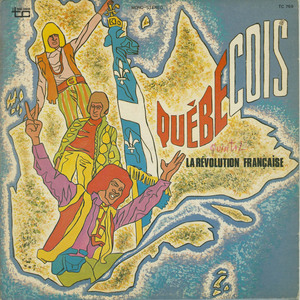
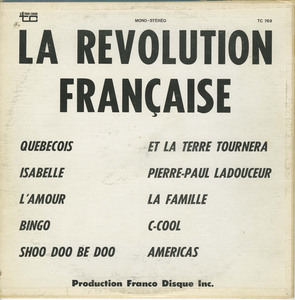
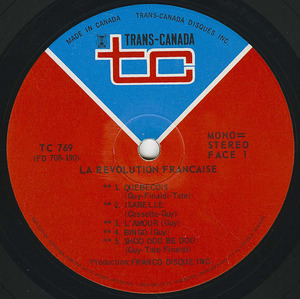
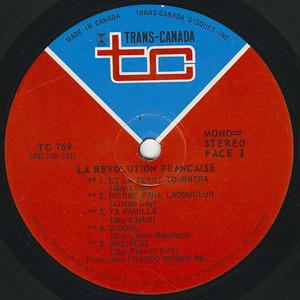
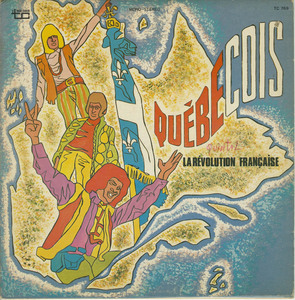
No Comments